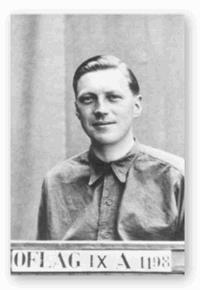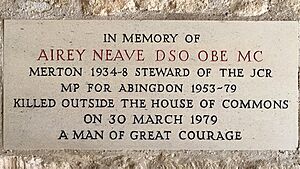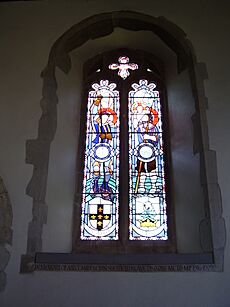Airey Neave facts for kids
Quick facts for kids
Airey Neave
|
|
|---|---|

Neave between May 1940 and May 1941
|
|
| Shadow Secretary of State for Northern Ireland | |
| In office 4 March 1974 – 30 March 1979 |
|
| Leader | |
| Preceded by | Francis Pym |
| Succeeded by | Alec Jones |
| Parliamentary Under-Secretary of State for Air | |
| In office 16 January 1959 – 16 October 1959 |
|
| Prime Minister | Harold Macmillan |
| Preceded by | Ian Orr-Ewing |
| Succeeded by | William Taylor |
| Parliamentary Secretary to the Ministry of Transport | |
| In office 18 January 1957 – 16 January 1959 |
|
| Prime Minister | Harold Macmillan |
| Preceded by | Hugh Molson |
| Succeeded by | John Hay |
| Member of Parliament for Abingdon |
|
| In office 30 June 1953 – 30 March 1979 |
|
| Preceded by | Sir Ralph Glyn |
| Succeeded by | Thomas Benyon |
| Personal details | |
| Born |
Airey Middleton Sheffield Neave
23 January 1916 Knightsbridge, London, England |
| Died | 30 March 1979 (aged 63) Westminster, London, England |
| Cause of death | Assassination (car bomb attack) |
| Political party | Conservative |
| Spouse |
Diana Giffard
(m. 1942) |
| Children | 3 |
| Parents | Sheffield Airey Neave (father) |
| Alma mater | Merton College, Oxford |
| Occupation |
|
| Profession | Barrister |
| Military service | |
| Allegiance | |
| Branch/service | |
| Years of service | 1935–1951 |
| Rank | Lieutenant colonel |
| Unit | Royal Artillery |
| Battles/wars |
|
Lieutenant Colonel Airey Middleton Sheffield Neave (January 23, 1916 – March 30, 1979) was a brave British soldier, a clever lawyer, and a Member of Parliament (MP). An MP is a person elected to represent a group of people in the UK Parliament. He was known for his amazing escape from a German prisoner-of-war camp during World War II. Later, he became an important politician. Sadly, he was killed in a car bomb attack in 1979.
Contents
Early Life and Education
Airey Neave was born in Knightsbridge, London, England. His father was a scientist who studied insects. Airey went to famous schools like Eton College and Oxford University.
While at Eton, Neave wrote an essay in 1933. In it, he predicted that Adolf Hitler's rise to power in Germany would lead to another big war in Europe. He had visited Germany and seen how the Nazis were gaining power.
At Oxford, Neave studied law. He also read many books about military strategy. He believed that war was coming, so it was smart to learn about it.
World War II Hero
Neave joined the British Army in 1935. In February 1940, he was sent to France. He was wounded and captured by the Germans in May 1940. He became a prisoner-of-war.
Escapes from Colditz Castle
Neave was held in several prison camps. In May 1941, he was sent to Oflag IV-C, also known as Colditz Castle. This castle was a high-security prison for Allied officers.
He tried to escape several times. His first attempt was on August 28, 1941. He dressed as a German officer, but his disguise was spotted.
On January 5, 1942, he tried again with a Dutch officer named Anthony Luteyn. This time, their disguises were better. They used a secret trap door from a play to get out of the prison. They traveled by train and on foot. They finally reached the border to Switzerland.
Neave then traveled through France, Spain, and Gibraltar. He returned to England in April 1942. He was the first British officer to escape from Colditz Castle. For his bravery, he received the Military Cross medal.
Working for MI9
After his escape, Neave joined MI9. This was a secret British intelligence group. MI9 helped Allied soldiers who were shot down or captured to escape.
Neave helped underground groups in Europe. These groups provided equipment, agents, and money to help soldiers escape. About 5,000 British and American soldiers were rescued this way.
After D-Day, Neave went to France and Belgium. He helped rescue over 300 Allied airmen. These airmen had hidden in forests after their planes were shot down.
Nuremberg Trials
After the war, Neave worked at the Nuremberg trials. These trials were held to judge important Nazi leaders for their crimes. Neave was a lawyer and spoke fluent German. He had the important job of reading the accusations to the Nazi leaders. He also wrote several books about his war experiences.
Political Career
After his military service, Airey Neave decided to enter politics. He joined the Conservative Party.
He ran for Parliament in 1950 and 1951. In June 1953, he was elected as the MP for Abingdon.
Neave was a member of the House of Commons committee on Science and Technology. He also served on the governing body of Abingdon School.
Supporting Margaret Thatcher
In 1975, Neave became a key supporter of Margaret Thatcher. He managed her campaign to become the leader of the Conservative Party. When Thatcher won, she made Neave the head of her private office.
He was then appointed Shadow Secretary of State for Northern Ireland. This meant he was the main spokesperson for the Conservative Party on Northern Ireland issues. He was expected to get this important job in the government if the Conservatives won the next election.
Assassination

On March 30, 1979, Airey Neave was tragically killed. A car bomb exploded under his car as he drove out of the Palace of Westminster car park. He was severely injured and died an hour later. He was 63 years old.
The Irish National Liberation Army (INLA) claimed responsibility for his death. Neave had been working on new policies for Northern Ireland. He wanted the British government to take a stronger approach against terrorist groups. It is believed this is why he was targeted.
After his death, Margaret Thatcher said Neave was "one of freedom's warriors." She praised his bravery, loyalty, and kindness. Prime Minister James Callaghan also promised that the murderers would be brought to justice.
Neave's death happened just before the 1979 general election. The Conservative Party won, and Margaret Thatcher became Prime Minister. Neave's wife, Diana, was later made a member of the House of Lords.
As a result of Neave's assassination, the INLA was made illegal across the United Kingdom.
Media Depictions
Airey Neave has been shown in several films and TV shows:
- In 2000, he was played by Geoffrey Pounsett in Nuremberg.
- In 2009, Dermot Crowley played him in Margaret.
- In 2011, Nicholas Farrell played him in The Iron Lady.
- In 2014, Tim McInnerny played him in Utopia.
Works
Airey Neave wrote several books about his experiences:
- 1953 – They Have Their Exits (about his escapes)
- 1954 – Little Cyclone
- 1969 – Saturday at MI9 (about his work with MI9)
- 1972 – The Flames of Calais: A Soldier's Battle, 1940
- 1978 – Nuremberg (about the trials)
Images for kids




